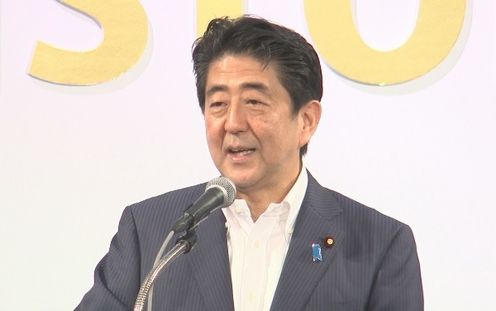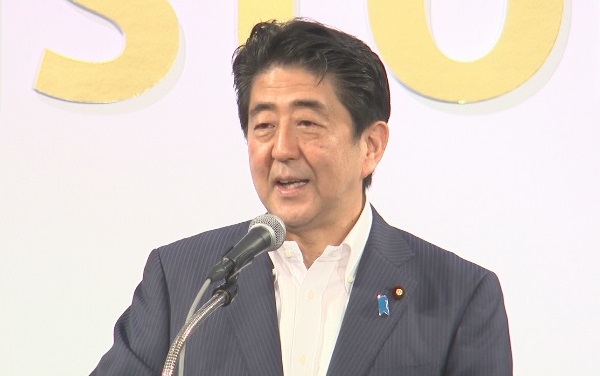Home > News > The Prime Minister in Action > July 2015 > The International Conference for Women in Business
The Prime Minister in Action
The International Conference for Women in Business
July 26, 2015
[Provisional Translation]
Prime Minister Shinzo Abe attended the 20th International Conference for Women in Business held in Tokyo.
The Prime Minister said in his address,
“I have truly been looking forward to being able to meet here with all of you, women who are active in each region of Japan and overseas, and the day has finally come.
In the two and a half years since the inauguration of my administration, I have continuously stated that the realization of a society in which all women shine is a policy of the highest priority for my administration, and we have been taking measures to achieve this goal. Former minister Masako Mori is in attendance today. She produced significant results as the Minister in charge of Support for Women's Empowerment during the second Abe Cabinet.
In the past two years, the number of working women in Japan has grown by more than 900,000 people. Furthermore, the number of women active in executive positions has increased at a speed six times what it was prior to this point. Internationally, the changes occurring in Japan are receiving great praise. A report issued by the OECD just the other day commended the active participation of women in the labor market in Japan, and stated that this was energizing the growth of Japan’s economy. That said, the OECD did not forget to add that greater effort is needed to allow more women to move up career ladders.
The Government will not let up in our efforts to remove barriers to active participation by women. The government officials in Kasumigaseki, where most ministries and agencies are located, are well-known for working long hours of overtime. They are now participating in ‘Yu-Katsu,’ which is an initiative that aims to transform people’s lifestyles. They get to work early, and they leave work soon after the day ends. They are able to spend the evenings enjoying their private lives and with their families. I have heard the criticism that by starting ‘Yu-Katsu,’ all we have done is pushed back the start of the workday to an earlier time. However, nothing will change in the world if we do not start something new. On July 1, when ‘Yu-Katsu’ started, 65% of public employees finished work on time. This movement includes not only the 220,000 public employees, but also employees in local public bodies and private companies. Nevertheless, I believe we must make the most of this movement, and take this opportunity to revise the working habits of society as a whole and encourage change.
On July 1, I too left the Prime Minister's Office while it was still light out. I first went to a museum to enjoy some paintings, and then I was able to spend time enjoying a drink at a Japanese-style diner in the shitamachi (old downtown) area of Tokyo. That being said, my secretaries had to keep me company at that restaurant until the first drink was done, so I suppose, therefore, that they were perhaps not yet done with their jobs that day. In any case, this movement has only just started and it is still finding its way, but I hope to use this as an opportunity to change the way we work.
Up to this point, our society has been premised on working long hours, and within that, it has been difficult for women to actively participate in a wide range of fields. For the purpose of raising productivity as well, we must rethink the rampant practice of working long hours. We must work more efficiently in the same number of hours. Leading fulfilling private lives and taking breaks will give rise to more sophisticated ideas. In order to resolve the issue of Japan’s declining population, we need to reform working hours. For Government procurements, we will introduce a framework that more highly appraises companies that engage in work-life balance practices, thereby supporting active participation by women. We will also strongly advance revisions to labor regulations, including changes to thoroughly ensure that workers are able to acquire paid leave.
Last year, a meeting of male leaders issued a declaration of action stating that they would accelerate the active participation of women who shine. The heads of leading Japanese companies have personally declared that they will take action to support active participation by women. The mindset of top level management in Japan is clearly starting to change. Furthermore, I am also aware that companies that are making efforts to advance the careers of women are in leading positions in terms of business performance as well. According to one research firm’s analysis, the stock prices of companies that have women in executive positions are higher than that of companies with no female executives by as much as 30% or more. Research has also come out showing that there is high interest among investors regarding whether companies are promoting women to executive positions or not.
If the bill on promoting active participation by women that is currently being discussed in the Diet is enacted, all major companies will need to formulate plans for active participation by women. In order for these plans to be effective, the Government will offer further support so that ambitious women can continue to be active in their workplaces and advance their careers. It is extremely important that the many women who support life events such as childbirth, childrearing, and nursing care, are able to continue their careers. In order to enact the plan to accelerate the elimination of childcare waiting lists with certainty, we have been devoting efforts toward securing more children’s nurses. We will also offer further support for companies providing training opportunities in order to respond to the requests of women hoping to actively enhance their skills during childcare leave and after returning to work. At the same time, it is true that there are many women who leave their workplaces in order to provide care for their families. We will work to create systems through which people can flexibly take family and nursing care leave in order to make it easier for people to support their families through care while continuing to work.
The potential of women is diverse and limitless. I would like you all to unleash that potential to drive the growth of Japan further forward. To date, there have been relatively few women active in science and engineering fields. I have heard companies that seek to actively hire women in these fields lament the fact that there are few candidates available. To that end, relevant people in industry, academia, and the Government will work together to set up a network that will foster ‘Rikejo’ (women who are actively involved in the sciences), such that starting from junior high and high school age, girls will be able develop their interest in the sciences and draw up career plans in the relevant fields.
When I visited Kobe in May, I had the opportunity to meet with female entrepreneurs. Based on their experiences raising children, as well as their painful experiences during the Great Hanshin-Awaji Earthquake, they have set up compassionate businesses. I also heard that there are active women among them who made attempts to start businesses while they were still in school. Businesses started by women provide new energy to society through the sophisticated ideas they generate. The Government will support the further success of these businesses. We will construct support networks for female entrepreneurs in each region through collaborations by people with experience starting businesses, regional financial institutions, and businesses that are central to their region.
Last month, I attended the G7 Summit held in Elmau, Germany. In that resort area, in a beautiful valley surrounded by European mountains, we agreed to a Summit Declaration that includes the statement that women’s entrepreneurship will be boosted under the leadership of German Chancellor Dr. Angela Merkel. It also states that the G7 countries will encourage participation in the labor force by all women around the world. This movement will be continued at the Ise-Shima Summit next year, when Japan will hold the G7 Presidency.
Next month, continuing on from last year, we will hold ‘WAW! (World Assembly for Women),’ an event that gathers female leaders from Japan and around the world in Tokyo. The theme for this year is set to be ‘WAW! for ALL.’ The message of this theme is a call to women and men in a variety of positions and from a different generations to think together and reform society together. This year, the assembly will call in particular for a change to long work hours and mindsets about the division of roles based on gender. In addition, we are planning to invite the participation of women from a variety of backgrounds, including single mothers and women in irregular employment. Furthermore, the assembly will discuss global issues surrounding women, such as disaster prevention and peacebuilding. I hope to utilize the results of ‘WAW!’ at next year’s Summit.
I am determined to continue our challenge of ensuring that women in Japan and around the world can shine even brighter. I attended this conference last year. This year, I have the impression that the number of men in attendance has increased. Normally, I would be saying that there are more women here this year, but the number of men has increased as well. That is to say, I believe that this is evidence that the active participation and role of women in society has become a national issue, and that understanding of this issue has deepened. The future of Japan hinges on whether or not we can create a society in which all women can shine. I truly believe that the energy of Japan will be generated by our diversity. I hope that by working together with everyone gathered here today, we can create just such a Japan. Let us continue to work hard together. Thank you very much.”


